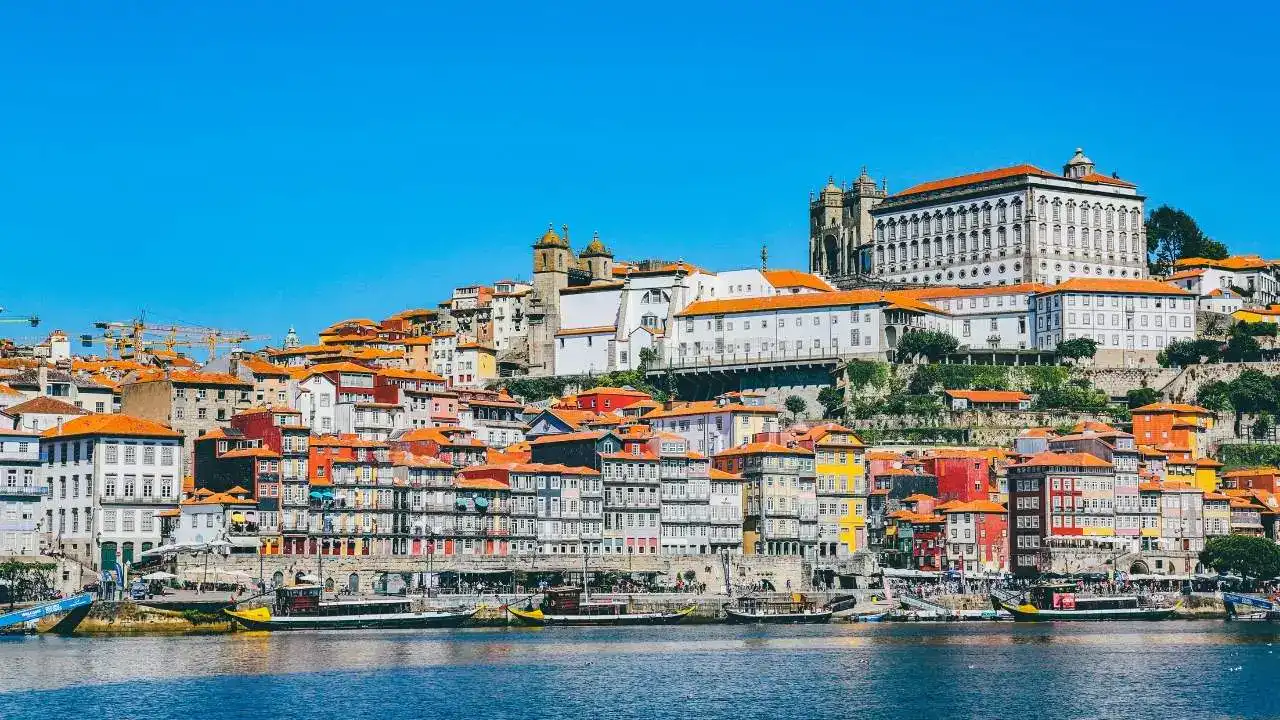Portugal: A European Hub of Culture, Opportunity and Quality Living
Portugal is ranked the 3rd safest country in the world by World Population Review and 7th on the Global Peace Index, making it one of the most secure places to live and invest.
Get expert help today – let us guide your move to Portugal.

Language:
Climate:
Portugal
A Snapshot
Portugal is a country in southwestern Europe, located on the Iberian Peninsula. It shares its borders with Spain to the north and east, and is surrounded by the Atlantic Ocean to the west and south. The country covers about 92,225 square kilometers and has a population of approximately 10.5 million people. Portuguese is the official language and is spoken by nearly the entire population. The capital city is Lisbon, and other major cities include Porto, Braga, Coimbra, and Faro. Portugal enjoys a temperate climate with mild winters and warm summers. As a member of the European Union, it benefits from open borders, making travel and business easy.
Culture & Lifestyle in Portugal
Portugal’s culture is rich and deeply rooted in its music, food, architecture, and festivals. Cities like Lisbon, Porto, and Guimarães have earned recognition as European Capitals of Culture. Traditional music like fado expresses deep emotion, while art and architecture shine through styles like Manueline and the famous azulejos (painted tiles). Festivals are a big part of life—Lisbon’s Santo António and Porto’s São João in June are especially popular. Portuguese people are known for being welcoming; the country was ranked the 7th friendliest in Europe in 2023. Family is central to daily life, with meals being long and social. Portuguese cuisine is a highlight, with many ways to cook bacalhau (salted cod), plus fresh seafood, pastéis de nata (custard tarts), and world-renowned wines. A relaxed coastal vibe, coffeehouse culture, and historic towns add to the charm.
Food & Family
Friendly & Festive
Join over +1,000 happy clients!






Why Choose Portugal?
Here are the reasons why you should choose Portugal:
High Livability in Portugal
Portugal is known for offering an excellent quality of life. It consistently ranks among the safest countries in the world and boasts a low crime rate. Residents enjoy access to universal healthcare and a well-developed public education system. Combined with affordable living costs, modern infrastructure, and a pleasant climate, Portugal stands out as a top choice for retirees, expats, and families alike.
Safety & Healthcare
Ranked among the top 10 safest countries globally.
Very low crime rates create a peaceful living environment.
Universal healthcare offers both public and private services.
Portugal’s healthcare system is ranked among the best in the world.
Average life expectancy is 82 years, above the OECD average.
Education & Infrastructure
Public education is strong, with about 99% literacy.
Portuguese students score above average on international tests (PISA).
Cities like Lisbon and Porto have efficient metros and public transport.
Modern infrastructure includes quality roads, rail networks, and airports.
Fast broadband and mobile networks cover both urban and rural areas.
Housing & Cost of Living
Housing quality is generally high, especially in newer developments.
Portugal ranks above average for housing safety and environmental quality.
Cost of living is low compared to other Western European countries.
A couple can live comfortably on $2,500–$3,000/month outside major cities.
Even in Lisbon or Porto, living costs are lower than in U.S./UK cities.
Daily expenses like groceries, dining, utilities, and rent are affordable.
Healthcare co-pays and basic food items (bread, eggs, coffee) are inexpensive.
Why it Matters
Economy & Innovationin Portugal
Portugal has built a strong, diverse, and export-driven economy that continues to grow steadily. After the pandemic, GDP bounced back with a notable 6.8% growth in 2022, outperforming many EU countries. The economy is powered by tourism, technology, and renewable energy. While services like IT, finance, and tourism lead, high-tech industries and advanced manufacturing are becoming key players. Traditional sectors like textiles, footwear, and agriculture have embraced innovation and moved into premium markets.
Portugal is also a global leader in renewable energy, with wind and solar covering a large part of the electricity needs. The country is investing heavily in green hydrogen and electric vehicle battery production. Exports account for around 50% of GDP and include cars, electronics, machinery, minerals, and agricultural goods. Key trade partners include Spain, France, Germany, the UK, USA, and Brazil.
Strong Trade & Global Ties
Exports = ~50% of GDP, including tourism, vehicles, and electronics
Top trading partners: Spain, France, Germany, UK, USA, Brazil
Foreign investment is rising: 40% growth in 5 years
Ranked among top 25 countries on the FDI Confidence Index
Tech & Startup Growth
4,700+ startups as of 2024 (16% growth from the year before)
63% of startups are in ICT – software, fintech, AI, green tech
Web Summit in Lisbon is one of the world’s biggest tech events
Startup hubs: Lisbon, Porto, Braga, Guimarães, Aveiro, Faro
Government support through programs like Startup Portugal
Innovation & Future Industries
Focus on renewables: wind, solar, green hydrogen
Growth in EV batteries, biotech, robotics, pharma
Innovation in traditional sectors like wine, cork, and textiles
Top universities and tech centers fuel research and development
Why it Matters
Legal & Tax Advantages in Portugal
Portugal offers some of the most attractive legal and tax benefits in Europe for foreigners. There are multiple residency options available, each designed to suit different profiles—from investors and entrepreneurs to retirees and remote workers. These visas provide visa-free access to the Schengen Area and open a path to permanent residency or citizenship (typically within 5–6 years).
The country also offers generous tax incentives, including reduced income taxes and exemptions on certain foreign earnings. Combined with strong legal protections as part of the EU, Portugal is a smart choice for expats, investors, and digital professionals.
Residency Options
Golden Visa: For those investing €500,000+ in real estate or funds; leads to EU residency and citizenship.
D7 Visa: Ideal for retirees or individuals with stable passive income.
Startup/Tech Visa: For entrepreneurs and skilled tech workers.
Digital Nomad Visa (D8): For remote workers earning income from abroad.
Key Benefits
All visa types offer Schengen travel and path to citizenship in 5–6 years.
No wealth tax and only 10% inheritance tax (non-direct heirs).
No double taxation: Treaties with 80+ countries.
Tax Incentives
Incentivised Tax Status (formerly NHR):
Corporate tax is 21%, with lower rates for SMEs.
R&D and job creation benefit from tax credits.
Why it Matters
Digital Nomads & Remote Work in Portugal
Portugal is a rising favorite among digital nomads. The Digital Nomad Visa (D8), launched in 2023, allows non-EU remote workers earning foreign income to live in Portugal for at least one year (with renewal options). Applicants typically need to show monthly income of around €3,000–€4,000.
Visa holders enjoy legal residency and full access to the Schengen Zone. Portugal’s warm climate, safety, English proficiency, and affordable lifestyle make it ideal for location-independent workers who want both productivity and quality of life.
Why Digital Nomads Love Portugal
Legal Stay + Schengen Travel: Full rights to live and work remotely
Affordable Living: Lower costs than most of Western Europe
Great Work-Life Balance: Work in cafés, hike or surf on weekends
Top Coworking Hubs
Lisbon: LX Factory, Second Home, Avila Spaces
Porto: The Hop, Regus
Other Cities: Braga CoLAB, Faro Cowork Fábrica
Seaside & Islands: Lagos, Nazaré, and Madeira’s Digital Nomads Village
Why it Matters
Education & International Students in Portugal
Portugal welcomes over 75,000 international students each year, thanks to its respected universities, low tuition, and vibrant student life. From the historic University of Coimbra (founded in 1290) to modern institutions like Lisbon, Porto, Nova, and Minho, the country offers a wide range of academic programs.
Many universities offer degrees in English, especially in areas like business, engineering, IT, and tourism. Portuguese degrees follow the Bologna Process, allowing easy credit transfer within Europe. Combined with lower living and tuition costs than in most Western countries, Portugal stands out as a high-value education destination.
Cost of Study & Living
Public tuition (EU students):
Non-EU students: Typically €2,000–€6,000/year
Living costs:
Scholarships and discounts available at many institutions
Why Students Choose Portugal
Affordable, quality education with global recognition
Safe and welcoming environment with friendly locals
English widely spoken, especially in academic settings
Easy travel and rich culture—beaches, festivals, nearby Spain
Strong student support and active international communities
Why it Matters
Why Top Stars Are Choosing Portugal
Portugal’s stunning landscapes and rich culture are drawing world-famous names like Michael Fassbender, Scarlett Johansson, and Bonnie Tyler to call it home.

Acclaimed actors Michael Fassbender and Alicia Vikander have made Lisbon their home since 2018. Their move was influenced by the desire to remain connected to Europe post-Brexit. Vikander shared her immediate affection for the city.

Hollywood star Scarlett Johansson purchased a luxury apartment in Lisbon's upscale Príncipe Real neighborhood. Drawn by the city's unique blend of history and modernity, she joins a growing list of celebrities captivated by Portugal's allure.

Welsh singer Bonnie Tyler has long cherished her residence in Portugal's Algarve region. Owning a modern villa in Albufeira, she spends significant time enjoying the area's natural beauty and tranquility.


